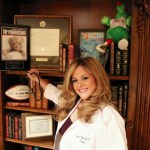After a, thankfully, transient health scare, Oprah Winfrey offers some sound advice: “Number one? Don't Google your symptoms.”
While cooking, the media mogul noticed a swelling below her chin that enlarged as she prepared her meal. Panic-stricken she went on the Internet and searched “swollen lymph gland causes” which, of course, yielded: “None of the results was good.” She made an urgent appointment with her doctor that afternoon. Her worry and dread manifested a personal blood pressure rise to 150/80 as she anticipated the ever-increasing likelihood of receiving life-changing bad news later that day. So, when her internist gave her the prescription of increasing her hydration and sucking on lemons as a cure for a very common fleeting condition of a clogged salivary gland, she was in such disbelief she had to seek a second opinion.
And that opinion reinforced the first.
She dutifully followed directions with profound improvement in a day and complete resolution in two. The situation prompted her to write up and record her harrowing, but ultimately grateful experience. In her account, she marvels at the realization we all recognize when health goes awry, that we need to emphasize our appreciation for every bodily function that quietly allows us to navigate the world. It is pretty standard in human nature to take such things for granted and not value them until they are gone.
Her story is a precious reminder of that. Good health is everything.
But, her anecdote details an event that occurs day in and day out in our modern times. The onslaught of our Information Age, when not employed responsibly or with a discerning eye, can often do more harm than good.
Being a physician, the entire purpose of your enduring the extensive, exhaustive medical training is intended to teach you to sift through vast amounts of data to draw the most accurate, optimal conclusions, while minimizing suffering. It requires assessing the entire history, so as to narrow further and further the solutions most efficiently and effectively – again, to minimize suffering. Utilizing all of your senses to incorporate keen observational skills to facilitate, yet again, the minimization of suffering. The doctor's relentless acquisition of such comprehensive knowledge of anatomy, learning every organ system from microscopic to gross detail, understanding the mechanism of action of drug metabolism and its dynamic course depending on the unique qualities of the patient along with the countless hours of actual real-world practice that enhance pattern recognition underscore the importance of nuance so as to inform, fully, diagnosis and management of disease.
This is why Ms. Winfrey’s doctor – and her second opinion - was able to make such a rapid, reassuring diagnosis and treatment plan. Years and years of study and practice enable such quick and complex detection.
Shortchanging the process in healthcare more often than not shortchanges you.
What a non-trained person sees is a facial swelling. What they “Google” may or may not even be the proper anatomy. What they discover is routinely a wrong trajectory based on bad data. And, the negative chain reaction ensues.
In medicine, good data saves lives, while bad data can end them. Speculation, albeit by Facebook crowd-sourcing or consulting with "Dr. Google" before seeing a trained professional, can do meaningful harm. Especially before a diagnosis is made.
As a doctor, a cursory exam involving inspecting the mouth and palpating the lesion compounded by the context of increasing swelling upon cooking – which implies eating from taste-testing and sampling for readiness of the meal – would guide swiftly to that more friendly and palatable of diagnoses of salivary gland blockage. Accompanying this reassuring verdict would have been peace of mind, a priceless remedy.
Like most advances, in particular technological innovations, that make our lives more convenient and easy, proper use can make all of the difference in the world. There is tremendous benefit with the Internet when someone receives a devastating diagnosis. There are innumerable reliable, reader-friendly resources that can assuage fears and help connect individuals to specialists or other patients with shared experiences. In that regard, the Internet can help achieve the desired goal of minimizing suffering. The fine line between its capacity to calm and its ability to alarm must be responsibly managed, or you will lose the invaluable commodity of time inundated with fret and worry.
Information is like any other medical therapy. When in a therapeutic range, it can be curative. At toxic levels, it can be destructive. Information quantity will never trump quality.

